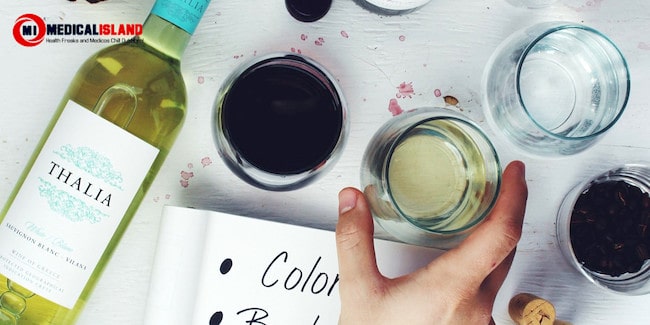We all know that drinking too much alcohol can have a negative impact on your health. The most well-known health risks of excessive alcohol consumption include long-term liver damaged and an increased susceptibility to certain types of cancer. But did you know that excessive alcohol consumption can also have an increasingly negative impact on your health as you age? Senior citizens who drink are more likely to visit their online pharmacy (see here) with regular minor health complaints and will even have an increased risk of developing memory loss and Alzheimer’s Disease.

Here are just some of the effects of alcohol on ageing, and how you can minimise and control their risks:
Premature Ageing
Have you ever noticed that heavy drinkers always look considerably older than their years? This is because chronic alcohol consumption can lead to an accelerated ageing process (sometimes called premature ageing). Wrinkles, puffiness, dryness, red cheeks and purple capillaries are all signs of alcoholism that you can notice on an individual’s face. Not only does this mean that the skin will lose its fullness and become more prone to marks and wrinkles, it also means that you would experience many of the physical signs of ageing too. These can include but aren’t limited too: irregular cardiac rhythms, gastrointestinal disorders, neurocognitive deficits, bone loss, and depression. Some of these conditions (such as depression) can be controlled with online pharmacy medication but others (such as bone loss) cannot easily be reversed.
If you are drinking excessively and noticing that this is having a negative impact on your overall health and leading to the early onset of premature ageing, then it is important to change your lifestyle before these effects become permanent. As with smoking, it is possible to reverse the effects of excessive alcohol consumption, provided any associated illnesses and diseases are caught and treated as early as possible.
Changes Reaction to Alcohol
The way in which your body responds to alcohol will also change as you age. When we are young we find that we bounce back quickly from a night of overindulgence: our hangovers may be intense, but they are also relatively short. This is not the case as we begin to age. Over time, our tolerance for alcohol consumption will lower, meaning that we feel the effects of the alcohol we have consumed after just one or two drinks (as opposed to the four or five we would need in our twenties). We will also suffer hangovers that last longer, meaning that drinking too much won’t just ruin your weekend, it could well ruin your whole week!
Because of these negative side effects, many older people choose to cut back the amount of alcohol they consume. This is good news, but it’s important to remember there is no need to stop drinking alcohol altogether. In fact, alcohol consumption in moderation can actually be good for your health: consuming just one glass of red wine per day, for example, has been found to lower your risk of suffering from heart disease. Red wine contains resveratrol, which is an antioxidant that contains good HDL cholesterol: this has been shown to protect arteries from damage. If you enjoy a drink, then doctors recommend switching to red wine rather than any other type of alcohol, to take advantage of these benefits.
Risk of Falling
When you’re drunk your reflexes are impaired and you become unsteady on your feet. This can be particularly dangerous for older people, as the ageing process makes the bones more brittle, meaning that you are at more risk of serious injury if you have a trip or fall.
The fact is that if you fall over when you’re twenty then you are likely to suffer a few bumps and bruises, but ultimately, you’ll bounce right back. If you have the same fall when you’re in your sixties or seventies then you’re more likely to suffer worse injuries with negative long-term impact, such as hip fractures or spinal damage. These injuries will also take longer to heal and recover from the older you are. This is one of the main reasons that most doctors don’t recommend that senior citizens indulge in more than one or two units of alcohol a day (and no more than seven units of alcohol over the course of a week)
Neurological Changes
Whilst much is always written about the negative impact of alcohol on the body, excessive alcohol consumption can be just as damaging to your brain. Alcohol consumption can cause premature ageing of the brain tissue. This can lead to serious neurological issues, many of which are irreversible once the changes have taken effect. Heavy drinking shrinks the brain volume and as well as causing mental confusion this could even have an impact on your physical health, leading to a lack of muscle control and loss of coordination.
Excessive alcohol consumption, particularly over a prolonged period of time, can lead to the reduced resiliency of physiological function and efficiency of the normal cognitive process. This will leave you feeling forgetful, more prone to making mistakes, and less able to complete ordinary, everyday tasks (such as remembering your shopping list) that you used to be able to complete with ease.
Complicates Other Medical Conditions
The fact is that few of us will reach our old age without developing some medical conditions along the way – medical problems (no matter how minor) are an inevitable part of the ageing process. Many of these chronic medical conditions that are common in old age (such as high blood pressure, diabetes or arthritis) can be complicated by alcohol consumption, and many medications will very specifically state that they shouldn’t be taken with alcohol.
According to the American Diabetes Association, alcohol should be avoided completed by those with the condition because it can cause dangerously low blood sugar up to 24 hours after it has been consumed. Similarly drinking alcohol can lead to a short-term increase in blood pressure, which may be life-threateningly dangerous for individuals who are already experiencing problems with their blood pressure. As a result, if you have a pre-existing condition and continue to consume alcohol then it is very important to discuss this with your doctor. They may not be able to continue your treatment for your pre-existing condition until you are able to stop drinking, because of the risks involved with medication interaction. Mixing alcohol with medication can either reduce or intensify drugs' intended effects. Some medications already contain alcohol, which could have a dangerous impact on your liver when combined with alcohol and also increase the risk of worsened drug side effects. If in doubt, just don’t drink if you’re taking any kinds of medication. The impact could be life-threatening.
Impact Your Mood
Finally, we all think that having a drink or two will make us feel happier and put us in a good mood. But the fact is that alcohol is a depressant, and excessive alcohol consumption can actually have a negative impact on your mood. Too much drinking can lead to darkened moods, increased anxiety and an increase in suicidal thoughts. If you already suffer from depression or anxiety then drinking is only likely to make your condition worse – it is not recommended to drink alcohol at all if you suffer from these kinds of mood disorders.
Conversely, some researchers believe that Alcohol has anti-anxiety and anti-stress properties meaning that they can help you to relax. That doesn’t mean you should start drinking every day to help you to sleep or unwind (this is the start of the slippery slope to alcoholism) but it does mean that if you’re experiencing anxiety as the result of a significant life change then enjoying a relaxing drink or two could be beneficial. As with all things, no matter what your age, drinking alcohol is something that you should only do in moderation, and at levels, you are able to control and feel comfortable with.
